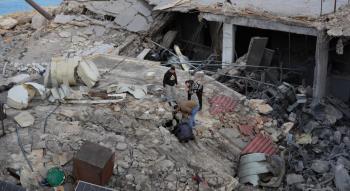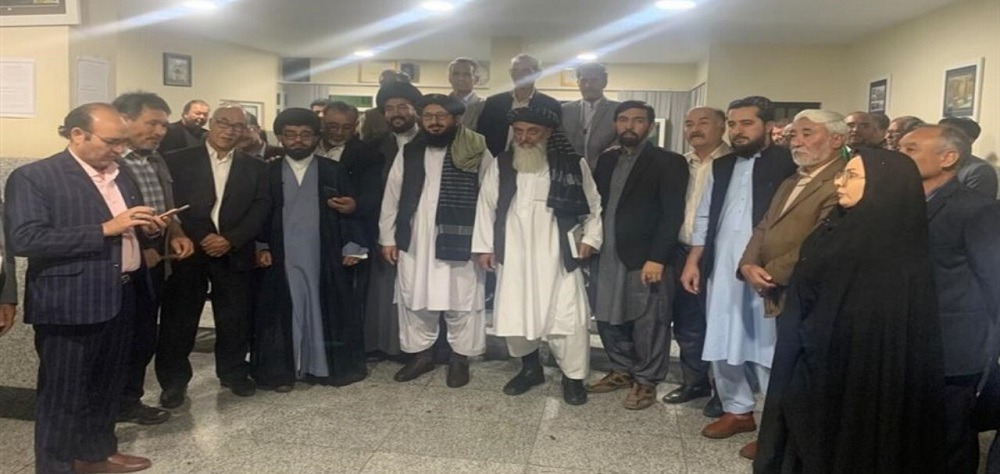Alwaght- Since the Taliban takeover of power in August 2021, the Afghan refugees case has been the most important obsession of the group which seeks to settle it with assistance from Iran and other regional countries. To this end, a delegation of Afghanistan ministry of immigrants and refugee return in recent days visited Iran and met in Tehran with representatives of Afghanistan immigrants in Iranian provinces of Sistan and Baluchestan and Qom, both home to major immigrant communities. According to a statement released by the ministry of immigrants, the representatives shared with Kabul delegation the problems the Afghan community in Iran is facing. In the meeting, Afghanistan ambassador Fazl Mohammad Haqqani was present. Recently, Iran’s ambassador to Afghanistan Mohammad Kazemi Qomi in a meeting with the Taliban officials discussed facilitation of return home of Afghan immigrants in Iran.
Since the Taliban came to power, many meetings have been held between the officials of this group and the representatives of the regional countries for the return of immigrants to Afghanistan, and achievements have been made in this field.
In December, Tehran hosted a “meeting of cooperation” of Iran, Pakistan, Afghanistan, and the UN High Commissioner for Refugees. Taliban pledged it would respond to calls by the participants to return millions of Afghan immigrants. A lot of work has been done since then. Abulmutaleb Haqqani, the spokesman to the immigration ministry said that since last year, over 820,000 Afghans, of whom 400,000 were deported, returned home from Iran.
In the past four decades, Iran has hosted the largest community of refugees, especially Afghan, in the world. Even during the former Iraqi dictator Saddam Hussein’s war on Iran and under cruel Western sanctions, the country did not deny services to millions of Afghan citizens. According to statistics, more than six million Afghan immigrants are currently living in Iran and Pakistan, and the interim government of Taliban is expected to fulfill its promises as soon as possible and pave the way for their return.
Since August 2021 that the Taliban seized the control of Afghanistan, hundreds of thousands of people fled the country to Iran driven by fear of the group’s persecution. They themselves are a source of many challenges to the hosting countries. That is why Iranian officials are trying to address their situation as soon as possible. In the current situation that world countries, including Iran, are struggling with major economic difficulties, the continued presence of millions of illegal immigrants will create new challenges for Tehran.
Illegal immigration of Afghans continues
Though Iran and the Taliban government are trying to return the Afghan immigrants home, Afghanistan situation is moving in a way that it is more repulsive than attractive to people and some prefer life in foreign countries over their country.
Tolo News website of Afghanistan reported that Afghanistan citizens say that their country’s economic conditions are not well and they find illegal immigration unavoidable for living. According to this report, poverty and unemployment in the country have caused hundreds of thousands citizens of the country to cross the border into Iran illegally every day. Taliban officials have said that human traffickers are taking people out of Afghanistan illegally for their own interests and have warned them to stop deceiving the citizens.
Illegal immigration of Afghans to Iran and other regional states neutralize all the measures taken for return of immigrants. This is a vicious circle because as many Afghans leave Iran, others fill their place illegally. Therefore, Taliban’s government make arrangements to prevent illegal new immigration.
Poverty and unemployment are the main causes of illegal immigration of Afghans to neighboring countries, and as long as the economic conditions are not improved in the country, it will be difficult and even impossible to settle this humanitarian crisis. The UN and other human rights institutions should pay more attention to Afghanistan economic conditions. The UN and the World Food Program reports indicate that about 90 percent of the people of Afghanistan live in poverty, and if no action is taken to improve the situation of millions of Afghans, the wave of illegal immigration will broaden in the future.
The UN Refugee Agency pays $375 in cash aid for each registered refugee who has a valid voluntary return form, but given the widespread economic crisis in Afghanistan, such small aid can make no difference and more global support is required. Above all, the Western countries that are responsible for this disastrous economic situation and insecurity in Afghanistan must take the necessary measures in the area.
Since the Taliban takeover, the US seized over $7 billion of Afghanistan assets for political reasons. If these financial resources are unblocked, a major part of Afghanistan People’s problems will be resolved. But the Westerners continue their destabilization of Afghanistan, taking hostage life of millions of Afghans.
Over the past four decades, Iran has spent money and time on Afghan immigrants behind its economic capacity, shouldering the shortcomings of the world community. But now Afghanistan conditions require work for their improvement from all countries. If the international community neglects Afghanistan economic predicament, in the future, new waves of immigration are highly likely, which would be risky not only to the regional countries but also to the whole world.



























